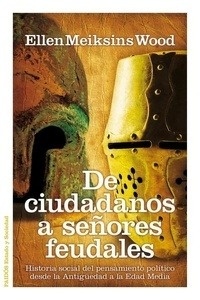De ciudadanos a señores feudales
Historia social del pensamiento político desde la Antigüedad a la Edad M

Editorial Paidós Ibérica
Fecha de edición febrero 2011
Idioma español
EAN 9788449324826
320 páginas
Libro
Dimensiones 15 mm x 23 mm
Resumen del libro
Una obra innovadora en la que Ellen Meiksins Wood analiza las ideas de los principales pensadores políticos de la tradición occidental, no solo en el contexto del lenguaje político sino como respuestas creativas que estos personajes, apasionadamente comprometidos, dieron a las relaciones sociales y a los conflictos que jalonaron la época en la que vivieron.
De ciudadanos a señores feudales ofrece una brillante exposición de los pensadores y las ideas que, desde la antigua polis griega de Platón, Aristóteles, Esquilo y Sófocles hasta el mundo medieval de Averroes, Tomás de Aquino, Marsilio de Padua y Guillermo de Ockham, pasando por la República romana de Cicerón y el Imperio del apóstol Pablo y de Agustín de Hipona, han dejado una huella indeleble en nuestro mundo.
Biografía del autor
In her writings on political theory, Ellen demonstrated how thinkers such as Plato or John Locke should not be seen as private geniuses contemplating timeless questions. She portrayed them as historical figures, grappling with the conflicts over property, power and justice that defined their societies.<br><br>Her approach was dubbed political Marxism by the French historian Guy Bois, and it was true that Ellen gave a greater emphasis to social and political conflicts than many Marxist historians did. She had reservations about the term: she accepted that political economy and economic developments mattered, but merely argued that on their own they did not explain great historical changes, and that political events deserved greater emphasis.<br><br>Advertisement<br><br>True to her roots as the child of Jewish socialist refugees from Latvia, Ellen proudly positioned herself on the side of the poor and the oppressed, celebrating those who have fought for a more democratic and egalitarian society. Born in New York, she was the daughter of Gregory Meiksins, an interpreter, and of his wife, the former Mischa Berg, a refugee settlement worker. The family moved to the west coast, where Ellen went to Beverly Hills high school and received a bachelor's degree in Slavic languages from the University of California, Berkeley, in 1962, and a PhD in political science from the University of California, Los Angeles, in 1970.<br><br>She moved to Canada in 1967, where she took up a position at York University, Toronto, and the following year married the political theorist Neal Wood. There she influenced scores of students, myself among them, and she became a Canadian citizen. When she retired in 1996, Ellen was inducted into the Royal Society of Canada.<br><br>From 1984 to 1993 she served as an editor of the New Left Review, based in London, where she lived for several years, and she also co-edited the New York-based journal Monthly Review (1997-2000).<br><br>Neal died in 2003. After five years together, in 2014 Ellen married Ed Broadbent, a former leader of the New Democratic party. Ellen is survived by Ed and her brothers, Robert and Peter.<br><br> Ellen Meiksins Wood, political theorist, born 12 April 1942; died 14 January 2016








